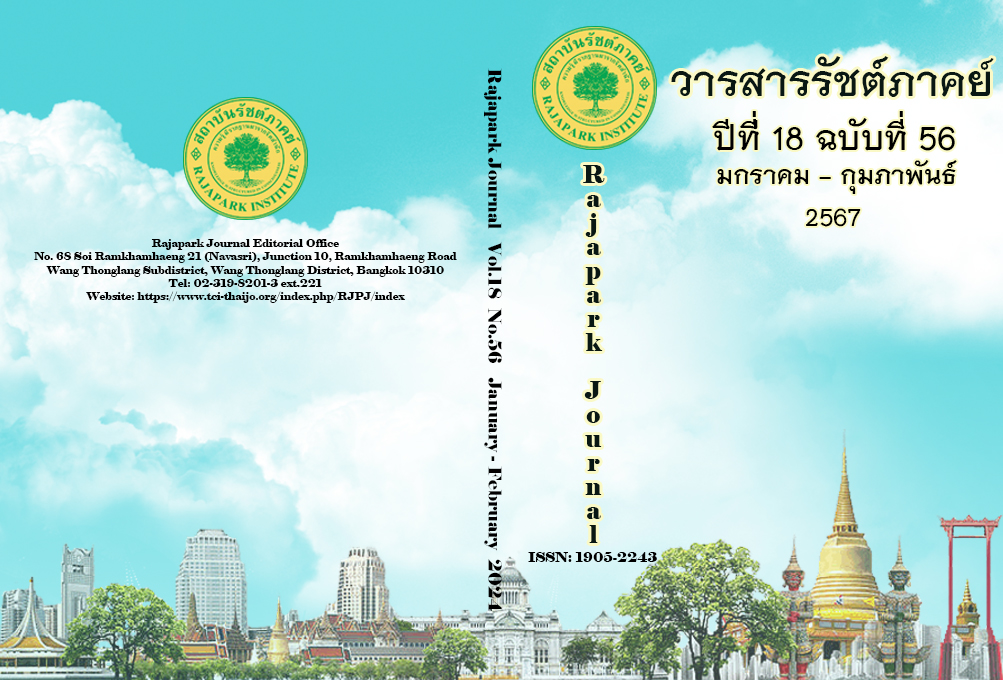การพัฒนาคุณสมบัติการวัดทางจิตวิทยาของแบบวัดความมุ่งมั่นทุ่มเทในงานของพนักงานรัฐวิสาหกิจ
Main Article Content
บทคัดย่อ
การวิจัยครั้งนี้มีวัตถุประสงค์เพื่อทดสอบโมเดลการวัดความมุ่งมั่นทุ่มเทในงานของพนักงานรัฐวิสาหกิจ โดยเป็นการวิจัยเชิงปริมาณ กลุ่มตัวอย่าง คือ พนักงานรัฐวิสาหกิจในเขตภาคกลาง จำนวน 195 คน เครื่องมือที่ใช้ในการเก็บรวบรวมข้อมูล คือ แบบวัดความมุ่งมั่นทุ่มเทในงาน สถิติที่ใช้ในการวิเคราะห์ข้อมูล ประกอบด้วย ความถี่ ร้อยละ ค่าเฉลี่ย ส่วนเบี่ยงเบนมาตรฐาน ค่าต่ำสุด ค่าสูงสุด และการวิเคราะห์องค์ประกอบเชิงยืนยันลำดับที่ 2 ผลการวิจัยพบว่า 1) ค่าความสอดคล้องระหว่างข้อคำถามกับวัตถุประสงค์ของแบบวัดความมุ่งมั่นทุ่มเทในงานของพนักงานรัฐวิสาหกิจอยู่ระหว่าง0.60-1.00 2) ค่าอำนาจจำแนกของแบบวัดความมุ่งมั่นทุ่มเทในงานของพนักงานรัฐวิสาหกิจอยู่ระหว่าง 0.521-0.882 3) ค่าความเชื่อมั่นของแบบวัดความมุ่งมั่นทุ่มเทในงานของพนักงานรัฐวิสาหกิจทั้งฉบับเท่ากับ 0.967 4) ผลการวิเคราะห์องค์ประกอบเชิงยืนยันลำดับที่สอง พบว่า ความมุ่งมั่นทุ่มเทในงานของพนักงานรัฐวิสาหกิจ ประกอบด้วย (1) ความประสงค์ที่จะทำงานอยู่กับองค์การ (2) ความผูกพันต่อองค์การ (3) ความผูกพันต่องาน (4) ความอุตสาหะในการทำงานอย่างระมัดระวัง และ (5) การสนับสนุนจากพนักงาน นอกจากนี้ยังพบว่าโมเดลการวัดความมุ่งมั่นทุ่มเทในงานมีความสอดล้องกลมกลืนกับข้อมูลเชิงประจักษ์ โดยมีค่าดัชนีความสอดคล้องดังนี้ (2= 293.295, df = 249, GFI = 0.903, AGFI = 863, CFI = 989, Nfi = .930, IFI = 989, RMSEA = .030, RMR = .025)
Article Details

อนุญาตภายใต้เงื่อนไข Creative Commons Attribution-NonCommercial-NoDerivatives 4.0 International License.
ทัศนะและความคิดเห็นที่ปรากฏในวารสาร ถือเป็นความรับผิดชอบของผู้เขียนบทความนั้น และไม่ถือเป็นทัศนะและความรับผิดชอบของกองบรรณาธิการ
เอกสารอ้างอิง
Akakul, T. (2009). Research Methodology in Behavioral Sciences and Social Sciences (6th ed.). Wittaya Offset Printing.
Boonsatorn, W. (2013). Create Passion for Thailand toward Creative Economy. Journal of NIDA Economic Review, 7(1), 307-355.
Boonthaim, H. (2021). Social Responsibility of the Mass Media and Work Passion Predicting Adversity Quotient of Employees in the Mass Media Professional Organization[Master’s thesis, King Mongkut’s University of Technology North Bangkok].
Cardon, M. S., Wincent, J., Singh, J., & Drnovsek, M. (2009). The Nature and Experience of Entrepreneurial Passion. Journal of Academy of Management Review, 34(3), 511–532.
Csikszentmihalyi, M. (1990). Flow: The Psychology of Optimal Experience. Harper and Row.
Curran, T., Hill, A.P., Appleton, P.A., & Vallerand, R.J. (2015). The Psychology of Passion: A Meta-Analytical Review of a Decade of Research on Intrapersonal Outcomes. Motivation and Emotion. DOI: 10.1007/s11031-015-9503-0
Dechkham, P. (2021). A Multilevel Structural Equation Modeling of The Causal Variables and Their Influence of Work Passion on Innovative Work Behavior of Small and Medium Enterprises Employees in Food Industry[Doctoral Dissertation, Srinakharinwirot University].
Diamantopoulos, A., & Siguaw, J.A. (2000). Introducing LISREL. Sage Publications.
Dumrongsanti, C. (2011). The Impact of Intangible Rewards and Leadership Communication Strategies on Talent's Passion[Master’s thesis, National Institute of Development Administration].
Greenberg, J., & Baron, A.R. (1997). Behavior in Organizations (6th ed.). Allyn Bacon.
Hair Jr., J. F., Anderson, R. E., Tatham, R. L., & Black, W. C. (1998). Multivariate Data Analysis (5th ed.). Prentice Hall.
Hair Jr., J. F., Black, W. C., & Babin, B.J. (2010). Multivariate Data Analysis: A Global Perspective (7th ed.). Pearson Education.
Hewitt Associates. (2003). Best Employers in Asia Research: The Engagement Model. http://www.asria.org/events/hongkong/june03/index_html/lib/BestEmployersInAsia2003.pdf.
Honderich, T. (1995). The Oxford Companion to Philosophy. Oxford University Press.
Houlfort, N., Philippe, F.L., Vallerand, R.J., & Menard, J. (2013). On Passion and Heavy Work Investment: Personal and Organizational Outcomes. Journal of Managerial Psychology, 29(1), 25-45. DOI: 10.1108/JMP-06-2013-0155
Lautongmeesakun, S. (2015). The Structural Equation Model of Teacher’s Work Passion: A Comparative Study of Generation Diversity [Doctoral Dissertation, King Mongkut’s University of Technology North Bangkok].
Lavigne, G. L., Forest, J., Fernet, C., & Crevier-Braud, L. (2013). Passion at Work and Workers’ Evaluations of Job Demands and Resources: A Longitudinal Study. Journal of Applied Social Psychology, 44, 255-265.
Mowday, R.T., Steers, R.M., & Porter, L.W. (1979) The Measurement of Organizational Commitment. Journal of Vocational Behaviour, 14, 224-247. http://dx.doi.org/10.1016/0001-8791(79)90072-1
Mungthanaworakun, N. (2015). A Comparative Study Work Passion and Organization Culture: Between Companies Listed on The Stock Exchange of Thailand and Companies Listed on the SET 100 Index[Master’s thesis, National Institute of Development Administration].
Ngamsompak, P., & Pasunon, P. (2017). Effects of Personal Characteristics, Job Characteristics and Organizational Characteristics on Burnout in the Transition Period of State Enterprise: A Case Study of Rubber Estate Organization. Journal of Open and Distance Innovative Learning, 13(1), 82-103.
Office of Labour Relations. (2023, May 1). The number of state enterprise employees. https://relation.labour.go.th/2017-08-25-02-37-40/73-2017-08-25-03-01-50.
Perttula, K. H. (2004). The POW Factor: Understanding and Igniting Passion for Own’s Work[Doctoral Dissertation, University of Southern California].
PPTV HD 36. (2023, 20 May). 3 Occupational Group have Burn out Syndromes in High the Cost of Living Problem. https://www.pptvhd36.com/news/%E0%B9%80%E0%B8%A8%E0%B8%A3%E0%B8%A9%E0%B8%90%E0%B8%81%E0%B8%B4%E0%B8%88/179341.
Rassameekaew, P. (2008). Administrators, Leadership Traits in Quality Schools[Master’s thesis, Silpakorn Univerity].
Silpcharu, T. (2008). Research and Statistical Analysis with SPSS. SE-EDUCATION.
Soralum, D. (2012). A Comparative Study Factors Affecting Work Passion in Cross Generations; Case Study of The Cement Thai (Kaeng Khoi) Co. Ltd[Master’s thesis, National Institute of Development Administration].
Srisatidnarakul, B. (2012). Development and Validation of Research Instruments: Psychometric Properties. Chulalongkorn University.
Tirakanan, S. (2008). Creating a Variable Measurement Tool in Social Science Research: A Practical Guide (2nd ed.). Chulalongkorn University.
Vallerand, R. J., Blanchard, C. M., Mageau, G.A., & Koestner, R. (2003). Les Passions de l’Âme: On Obsessive and Harmonious Passion. Journal of Personality and Social Psychology, 85(4), 756-767. DOI:10.1037/0022-3514.85.4.756
Vethisakul, W., & Boonsathorn, W. (2019). The Study of the Relationship between Passion, Transformational Leadership and Innovative Behavior: A Case Study of Human Resources Employees of a Financial Institution. Journal of BU Academic Review, 18(2), 14-25.
Zigarmi, D., Houson, D., Witt, D., & Diehl, J. (2009). Employee Work Passion. https://engageforsuccess.org/wp-content/uploads/2015/10/Employee_Passion_Vol.311.pdf


